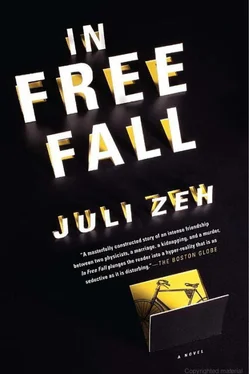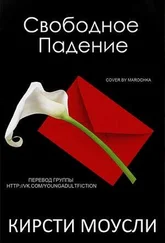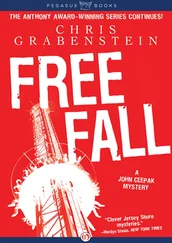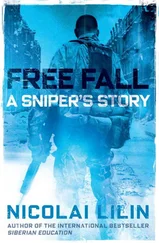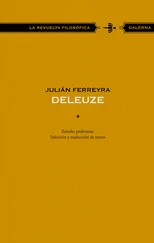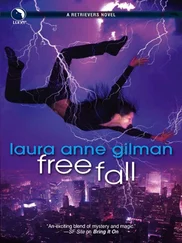“Tomorrow evening?” Sebastian asks.
“What are you doing over the weekend?”
Sebastian gets up to fetch him an ashtray.
“He’s taking me to scout camp on Sunday,” Liam says.
“And after that,” Sebastian says, crashing the ashtray down on the table, “I’m barricading myself in my study and turning our understanding of the world upside down.”
“What’s the work of genius going to be called?”
“‘A Long Exposure: or, On the Nature of Time.’”
“That suits you.” Oskar suppresses another fit of laughter. “And what’s Maike doing?”
“Three weeks’ cycling in Airolo. So, what’s going on tomorrow night?”
Oskar waves his hand mysteriously.
“In Airolo?” he repeats. “Alone?”
“Did you think I was bringing my senior registrar along, too?”
Maike has come back unnoticed, and is placing a bowl of tortellini on the table. Sebastian raises a palm and she gives him a high five, glancing sideways at Oskar at the same time. Unhappy that he is no longer the center of attention, Liam kicks his legs impatiently and slides off Oskar’s lap. Oskar stands up and, ignoring the ashtray, walks over to the window and watches as his cigarette butt falls into the canal and is carried away by the current. Bonnie and Clyde are nowhere to be seen.
“While we’re on the subject of holidays, perhaps you need a break, too.” Maike helps Liam light the candles—the flames are almost invisible in the evening light. “You don’t look as well as you normally do.”
Oskar strolls back to the table, hands in his pockets. “Insomnia,” he says.
“I’ll pull out the bed in the study for you. It’s quiet there.”
“The doctor has given me something.” Oskar taps his chest on the left side, as if he were wearing a jacket with inside pockets.
“Me too!” Liam shouts, running out of the room before anyone can stop him. A door slams, and a drawer in the bathroom is pulled open. When Liam returns, he is carrying a little plastic case in his palm.
“Travel sickness,” Maike says. “He gets as sick as a dog on longer journeys.”
“One for the way there, and one for the way back,” Liam says proudly.
Oskar looks at the tablets earnestly. “They look exactly like mine. Conditions like ours are the price to pay for extraordinary genius.”
“Really?” Liam’s eyes grow round, and points of light shine in his pupils.
“Enough of that,” Sebastian interrupts.
Oskar has sat down. He spears a piece of tortellini and holds his fork up in the air like a pointer.
“ Mes enfants ,” he says. “There are areas of thought that we do not traverse unpunished. Headaches and a bad character are the least we must pay. I know what I’m talking about, Liam.” When he stretches his hand out, Liam places his own in it quickly. “Your parents are lovely. But a bit too normal to know what real genius means.”
“Don’t talk nonsense to him,” Maike says heatedly.
“Tell me,” Oskar says, chewing thoughtfully on his pasta. “Is there some rocket in this, too?”
IN THE TWILIGHT, the chattering of the titmice is growing louder. They have a lot to talk about. A cloud of midges dance around an as-yet-unlit streetlamp, clearly drawn to it by the memory of light. Two swifts jaggedly circling their prey share the same memory.
Inside, the late evening has painted the walls red. Spoons are clinking on dessert plates; the wine in the glasses looks almost black. Liam is no longer allowed to talk and his pouting lower lip is hindering the consumption of his pudding. Maike is resting her chin in her hand, turning a spoon as she licks chocolate cream from it.
Quiet moments are as much a part of the Friday gatherings as confrontation, diplomacy, and barely averted war. In the reflective moments, it is mostly Maike who speaks. She enjoys talking about cycling, about the relentless heat on steep inclines with no shade, and the cool embrace of the wind as she goes downhill. About the quick changes in temperature in the layers of air, and about what freedom means—to reach a speed at which one can escape oneself. She says every time that speed preserves youth, and not only because physicists think that time passes more slowly for bodies in motion.
While Maike is speaking, Sebastian gazes at her intently. It is only when she laughs that he darts a quick glance at Oskar, as if there is something to share. He absorbs little of what she is saying. He is thinking about how much he loves Maike, yet how happy he is that he will have some time alone beginning the day after tomorrow. The thought of the three weeks ahead, which he will spend at his desk in isolation, brings on a shudder of anticipation. On the first day, he will fill the Volvo to the roof with shopping and then not leave the house at all. He will pull out the telephone cord, turn the television to the wall, and leave Oskar’s folding bed down in the study. He will lock the doors to the other rooms and thereby erase them from the map of his daily habits. It will be quiet. He will be entirely undisturbed for a few weeks—the greatest luxury that Sebastian can imagine. While thinking about space and time, images will form in his mind, not unlike the abstract brush strokes of Maike’s painters, who in their naive way, Sebastian has often thought, do nothing other than get closer to the true physical nature of things with the help of shapes and colors. For three whole weeks, Sebastian will relish the growth of the chain of letters across the computer screen, filling page after page until finally coming to the sentence that he has long kept ready for this purpose, the sentence that will form the crowning conclusion: “Thus, there is no more to say.”
Sebastian’s head sinks a bit lower, and his supporting hand pushes the flesh of his cheek upward. Oskar glances at him from across the table, humming in agreement now and then to keep Maike talking. As he does, he smiles at Sebastian, who has finally lost the thread and is secretly occupied with a question of physics. Once, Oskar would have been able to guess what his friend was thinking about by reading the play of his eyebrows and the silent movements of his lips, but those days are gone. He sits beside Sebastian’s thoughts as if by a river that he knows is flowing constantly, but can neither see nor hear. Despite this, Oskar still enjoys the presence of his friend’s river of thought. This means a great deal to him. Ever since his teenage years, he has felt as though he stumbled into the wrong century and is living the wrong life, while elsewhere—and above all, at another time—people like Einstein and Bohr are missing him in their discussions. Before the great European wars, there had been not only the necessary intellectual capacity but also the will to think a few things through to the end. Oskar wonders with longing what it would have been like to have been born in 1880. He can reconcile himself to very little in the world today, a world in which stupidity, hysteria, and hypocrisy reign, turning life into a carousel, rumbling along to music and spinning everything important away from the center, rendering it secondary. Sebastian’s presence is a consolation; but when he thinks about his friend, he grows impatient again. Sebastian is a renegade, a traitor to the cause of achieving a new intellectual revolution a hundred years after Einstein and Bohr. Every new departure from the path of theoretical physics is a departure from the possibility of their being together. If there is something that Oskar will never give up, it is his desire to get Sebastian back.
When Oskar realizes that Maike’s stream of talk has petered out, and that Sebastian is doing nothing other than tracing lines on the tablecloth with the handle of a spoon, he breaks the sudden silence by telling a vague anecdote about a young research assistant. The man got it into his head that he could come up with a brilliant idea, just as Heisenberg had while walking across an island, and he spent his entire salary on journeys to Sylt. There he tramped endlessly over one damn dike after another until he finally found out that the uncertainty principle had come to Heisenberg not on the island of Sylt, but on Heligoland—and then Oskar no longer knows where he is going with this, especially as the story isn’t even true; it had merely worked well once in another situation.
Читать дальше
